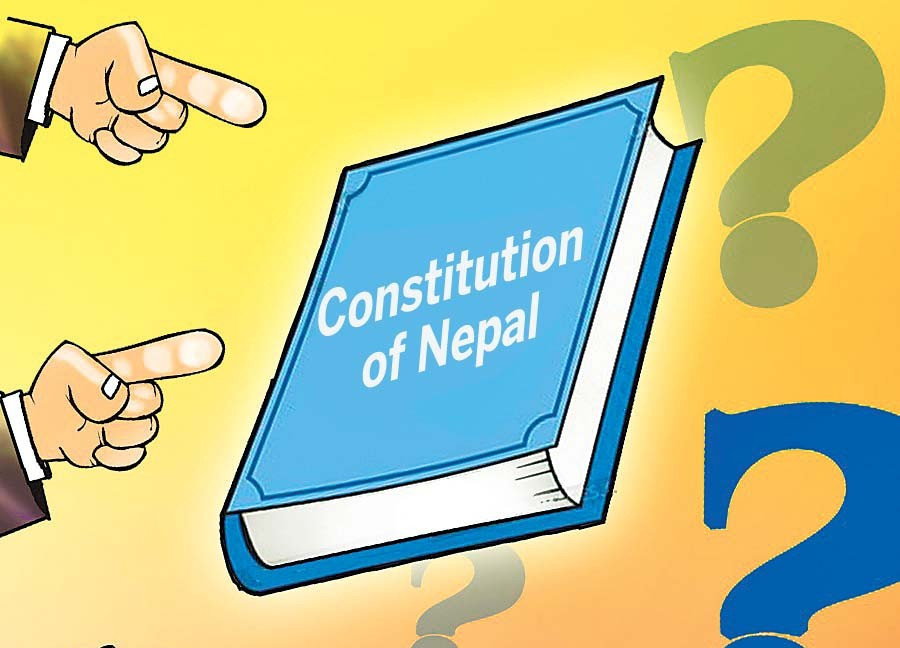Columns
Saving the constitution unconstitutionally
As long as the Karki govt heralds free and fair elections, it is more constitutional than the previous one.
Hridesh Gajurel
There has been much debate in Nepal about the constitutional status of the interim government that was formed following the Gen Z uprising. Many of the political leaders of the previous government are suggesting that the Nepali constitution does not provide any provision for the formation of this type of interim government made up of non-elected individuals. They argue that the interim government thus has no constitutional right to declare and conduct elections, let alone carry out corruption investigations and arrests. They demand that the previous parliament, which was elected by the people of Nepal, be restored.
On the surface, this appears to be a sound argument. It is concerned with preserving order, stability, inclusion, and democracy itself, which can only be done if political decisions are made not through arbitrary means like violent protests but rather through democratic and constitutional means like elections. The interim government could indeed be seen as ‘unconstitutional’ as there is no legal basis for the process through which it came about.
Was the previous government constitutional?
For the demands of the leaders of the traditional political parties to be taken seriously, it would have to be established that the previous government was constitutional. In fact, given all that has transpired since the fateful social media ban, including the death of dozens of protestors, it would have to be established beyond any doubt that the former government deserves to be returned to the seat currently occupied by the interim government.
Being elected to political office is not the be all and end all of constitutional legitimacy. It is unconstitutional to violate and disregard the key requirements and expectations of the constitution after being elected. The point of the constitution is not the electoral process itself but rather a faithful execution of constitutional provisions by accountable representatives of the people of Nepal. Judged against the 2015 constitution, a strong case could be made that while the previous government might have been elected, it was far from constitutional.
The constitution did not envisage a merry-go-round government where political parties frequently form and switch coalitions purely for the purpose of gaining power, with little regard for ideology or voter interests. The disregard for the crucial principle of political competition that underpins a Westminster-style parliamentary system that the constitution envisions was plain for all to see, especially when the two largest parties that were long seen as political rivals came together in a grand coalition. A representative parliamentary system cannot function as intended under these circumstances of political collusion.
Similarly, the principle of having checks and balances through a separation of powers is vital to the effectiveness of any representative democracy. The Nepali constitution calls for the operationalisation of this principle through the independence of the judiciary and other key state bodies like the Commission for the Investigation of Abuse of Authority. However, few would seriously claim that these bodies were independent. State capture by colluding political parties had largely prevented meaningful action against high-profile corruption scandals and blatant abuses of power, for example. The Nepali state apparatus and even a large portion of civil society were widely seen to have become politicised beyond repair.
Federalism, one of the centrepieces of the Nepali constitution, was another victim of Nepali politics as the leaders of the national political parties had a strong hand in picking the provincial government, violating the requirement for political distance. Provincial governments would change almost immediately after the frequent coalitional changes in Kathmandu.
There is also the issue of corruption, which the constitution expressly guards against both directly and via independent bodies. The ferocity of the anti-corruption protests that toppled the former government was an indication of the magnitude of constitutional failure on this front.
The list could continue but these points will suffice. Political competition, separation of powers, federal division of powers, and corruption control are the very foundations of Nepal’s 2015 constitution. As the traditional parties have largely failed to uphold these constitutional foundations in practice, it is no surprise that successive governments since the promulgation of the constitution have achieved little progress on numerous constitutional rights and promises. These include employment, decent education, equitable health services, justice, good governance, and freedom of speech, among others.
The closing of constitutional routes to change
The major political parties together had maintained such a stranglehold on the state apparatus, including through an informal takeover of key branches of the state, that they had essentially closed off all constitutional routes to the political change that was clearly needed for a faithful execution of the constitution.
This was compounded by the long wait of five years between elections. Even if elections would have been brought forward, however, major change would still be unlikely, especially considering how the traditional parties dominated the previous election despite the popularity of the ‘no, not again’ campaign.
The Election Commission is perhaps one of the few constitutional bodies to have remained relatively independent and an election is probably the only constitutional path to change that still remains somewhat viable. However, the rampant use of money well beyond what the Election Commission Act allows and the related bribing of voters by candidates to secure votes in rural areas in past elections has meant that the Commission’s relative independence has mattered little in practice.
The Election Commission depends on the support of other state actors including security forces, the courts, and local governments to hold truly free and fair elections. The informal capture of most of the state apparatus by the political elite had rendered the necessary support weak and fearful of going against traditional parties.
Truly free and fair elections can only happen in conditions where strong support free from political influence exists for the enforcement of the Election Commission Act. This is why having elections held by an impartial interim government that is not linked to political parties is the only way currently to ensure that Nepal has a real chance of having an elected government that is genuinely constitutional.
If only an ‘unconstitutional’ route can save the constitution from becoming nothing more than the paper it is written on, then that route is constitutional in essence because nothing is more important to the constitution than a faithful execution of the constitution. As long as the interim government has popular legitimacy and as long as it paves the way for truly free and fair elections, it is more constitutional in spirit than the previous elected government.




 9.93°C Kathmandu
9.93°C Kathmandu















